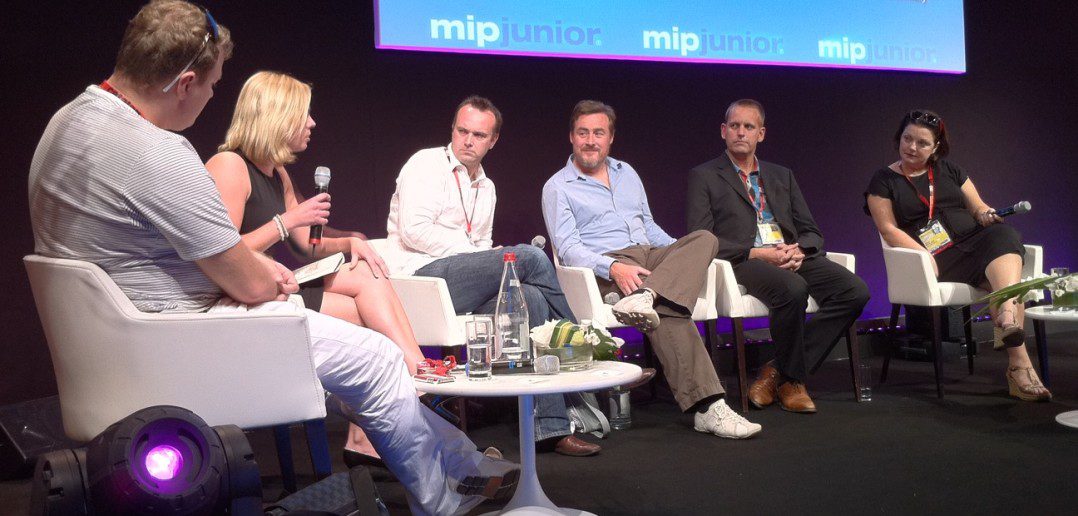Many of the successful apps and games on connected devices are based on TV shows, too, making it a big opportunity for the industry.
Today at MIPJunior, there was a session devoted to all things ‘I’, starting with an introduction from Connective Media CEO and creative director Jesse Cleverly.
“I came down the other day to find my four year-old daughter trying to move things on the TV screen,” he said, illustrating the rapidity with which children are adapting to touchscreen devices.
“Children are watching many screens at the same time,” he continues. “The thing to consider here is how do you as a producer attract high-quality attention from your audience?”
Cleverly also claimed that multi-functional devices will change the form of content, warning that TV companies “think their core business is television. It’s not. Your core business is creating content”.
“Staying unique is about to become the premium attribute. Be the pink Cadillac, not the grey corporate vehicle,” said Cleverly.
He also said creators should be looking to use TV as a marketing platform to build communities, which they then own – South Park now has 40 million friends on Facebook for example. “It doesn’t really need a television station any more,” suggested Cleverly, mischievously.
However, his core message was that TV companies should be diving into digital, and making the most of the many devices and opportunities.
The session also had a featured presentation from Helen McAleer, MD of Walker Books and Walker Productions, on the Digital Revolution in Kids’ Publishing.
“The rise of the e-book is becoming a really valid publishing format,” she says, while pointing out that the major players in the space like Apple and Google are non-book companies.
Furthermore, children are “digital natives” who are “happy to use anything and everything – mobile, iPad, laptops etc”. Yet they’re spending more time playing games and on social networks than reading.
She also talked about the “bumpy” rights issues in the books world, where publishers generally have the right to release e-books as extensions of existing physical books.
But once they add enhanced features like audio, video and gaming – making a book more of an app – there’s a bigger issue of where it sits rights-wise. “Often we have to go back to the table and renegotiate,” she says, while also explaining that Walker Books has restructured its business for digital, bringing in new skillsets and creating Walker Productions, a dedicated production business.
So far, it’s created two shows based on its books. Tilly & Friends and Fleabag Monkey Face have both been commissioned already. Meanwhile, Walker also has a licensing division to make more of its book series like Maisy and Guess How Much I Love You.
It will also have released 60 e-books by the end of 2010, and 300 by the end of 2011, with nine picture book apps already available for iPhone. “We’re working on lots of new projects for Android and iOS,” she said.
“You’ve got to experiment – there’s no market standard,” she said. “There’s no right or wrong.”
There followed a panel debate on some of the issues raised. Taking part are:
– Ilya Popov, general producer at SMESHARIKI
– Karen Heldoorn, head of digital department at Aardman Animations
– Marc Goodchild, editorial lead at BBC IPTV (Children’s)
– Jamie Cason, MD of Avril Digital
– Benedikt von Walter, senior manager of digital research and social responsibility representative North at MTV Networks Germany
The panel kicked off with two examples of the kind of new projects with strong digital aspects.
Aardman is working with the UK’s Tate museum and Fallon on The Tate Movie Project, which is getting 5-13 year-old children to collaborate on making an animated movie, encompassing animation, scripting, editing and sound effects.
Meanwhile, Smeshariki is a Russian animated TV series which has spawned massive success with 1.5 million game sales and an online community with millions of users that blends games and social features.
The latter gets more than 500,000 unique visitors a month, spending 30 minutes per visit, and there are more than two million registered users of the site, which has a target audience of 4-12 year-olds.
Onto the panel debate, which Cleverly moderated. Avril Digital’s Cason said it’s vital to be thinking strategically about the digital opportunities for any TV property, particularly for kids. He said the latest generation of devices is crucial.
“The touchscreen has been the thing that has changed those devices, and how they are used – how instant and accessible they are,” he says, while also hailing the launch of motion and gesture controlled interfaces for consoles: Wii’s Wiimote, but now also PS3’s Move controller and Xbox 360’s Kinect system.
Another point: the BBC’s Goodchild said it’s only a matter of time before someone releases an iPad-like touchscreen device aimed at children specifically, which is more robust (i.e. droppable) and also cheaper.
Later, he talks about what approaches to digital are working best for TV brands – “you want a good game with a great brand” – while also saying that he’s looking forward to the next generation of entertainment that goes beyond current ideas of ‘transmedia’ content on different devices.
“When a story can transcend those different platforms, where the story follows you rather than you chase the story, that’s when it gets really interesting,” he says.
Heldoorn was asked about how Aardman’s ‘traditional’ creatives – for example stop-frame animators – are kept in the digital loop, rather than left behind. She replied that the company makes its creatives a vital part of the process when working on digital spin-offs for brands like Shaun The Sheep.
McAleer says Walker Books is careful not to force authors into the digital space if they don’t want to be there, but that it finds that younger authors in particular take to digital with enthusiasm, often without being prompted.
How does television avoid what happened to the music industry ten years ago – “this horrible meltdown with these big arrogant corporations” – because they fought against digital rather than ran with it.
MTV’s Walter says there are key differences between TV and the music industry. For example, the TV industry is used to delivering free ad-supported content, so the internet isn’t as disruptive a change as it was for record labels.
MTV’s official website for South Park lets fans stream episodes in full, supported by ads, and has built a strong community as a result.
MTV’s existing relationships with advertisers – not something that record labels have ever had – were vital to that launch, which had the important effect of cannibalising online piracy of South Park.
And that’s a wrap, sadly with no time for Q&As.




